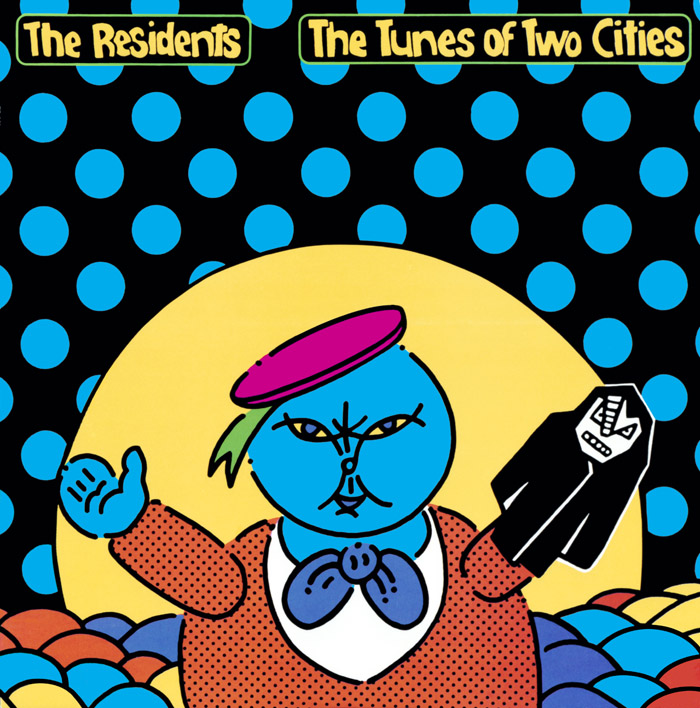The Tunes of Two Cities(1982)OverviewTracksUncle Willie
The Tunes of Two Cities is Part Two of The Mole Trilogy. It collects and contrasts examples of the music of the Mole and Chub cultures. The tracks alternate between the fluffy, Art Deco music of the superficial Chubs and the dark, tribal music of the Moles.
Chubs are only concerned with leisure and want nothing to do with real-world problems. To emphasize this, many of the Chub tracks are mutated covers of escapist big band songs from the 1920s and 1930s. For example, Mousetrap and Happy Home cover Stan Kenton's Eager Beaver and Machito respectively, and Smack Your Lips (Clap Your Teeth) is a version of In the Mood.
The Moles are a tribal, hard-working society who worship a dark god called "The Evil Disposer". The music of their songs features the Harry Partch-influenced use of invented instruments and languages, as did The Residents' other tribal culture album, Eskimo. In fact, one can look at the Mole music as being an extension of some of the ideas which The Residents examined at in that album, just as the Chubs' twisted versions of 1930s popular music harkens back to The Third Reich 'N' Roll's versions of '60s pop. The Mole tracks feature dark, primitive vocal lines made up of chants and prayers, while the Chubs' music is entirely instrumental. The only exception is the last track, Happy Home (sung by Nessie Lessons instead of the growling Residential lead singer found in the Mole tracks). The song is billed as an "excerpt from Act II of Innisfree", though no clue is given as to what that might mean. One theory is that Innisfree is a Chub musical about Moles roughly analogous to George Gershwin's Porgy & Bess (a musical by a white American about black slaves).
The Tunes of Two Cities was the first album The Residents made featuring their new toy, the EM-U Emulator. The Emulator was the first commercial sampler and The Residents were among the first to buy one (theirs was #00005 off the assembly line). That Emulator provides most of the instrumental sounds on the album, with the exception of the guest musician's contributions: Snakefinger's guitar work and Norman Salant's saxophone playing, both of which appear in Missy.
- Serenade for Missy
- A Maze of Jigsaws
- Mousetrap
- God of Darkness
- Smack Your Lips (Clap Your Teeth)
- Praise for the Curse
- The Secret Seed
- Smokebeams
- Mourning the Undead
- Song of the Wild
- The Evil Disposer
- Happy Home (Excerpt from Act II of "Innisfree")
The Tunes of Two Cities is essentially a prequel to Mark of the Mole. It consists of a dozen cuts: cultural samples, six from the Moles and six from the Chubs. The Residents alternate the pieces, cinematically intercutting the societies to pin down their characters and aspirations. And they do their work with an originality, a painstaking sense of detail, and an emotional wallop which makes Tunes, for me, their finest album.
The Mole cuts on Tunes are comparable to Eskimo, in that The Residents are again inventing the ritual music of a "primitive" society. Mole music embodies all the Residents' reverence for tribal cultures, and to keep the soul from being eclipsed by the hardware, they use voices on all the Mole cuts. The voices are wordless and highly stylized. Sometimes the weirdness is melodic, but more often it is timbral: "Maze of Jigsaws" has a howling, animalistic chorus, and a low, rippling solo voice; at the end, that voice returns in a distant, ghostly reinvention that's genuinely chilling.
Not surprisingly, Chub music is every bit a apocalyptic as Mole music. Chub music is pop, but by intercutting the two idioms, The Residents describe a commonality beyond musical structures. Mole music and Chub music are about the same thing, they serve the same purpose: the ritual exorcism of suffering. Almost all of the Chub cuts are covers of Big Band standards. So just as Mole music is an outgrowth of Eskimo, Chub music harkens back to The Third Reich 'N' Roll: Again, The Residents are trying to discern what's hateful, dangerous, and fascistic in pop culture; what values it betrays about ourselves. But if Reich 'N' Roll seemed self-consciously methodical and pyrotechnic, Chub music has an almost documentary coherence, a found-object integrity, because of its detail and relative uniformity.
Tunes is quintessential Residents, opening new mine shafts into their humor, experimentation, allusiveness, elusiveness.... yet it's also without a doubt their most accessible work. The expressive freedom of Mark of the Mole takes a quantum leap with Tunes, where the music wordlessly articulates the convictions that generated it. Role-playing and pyrotechnics, ordinarily The Residents' defenses against emotion, here serve to realize emotion, and this music can speak to people as no other work of theirs has.
Tunes reminds me of Citizen Kane: an original, technically sophisticated achievement that's more than accessible - it's downright entertaining. No easy trick, for both works are obsessed with wealth, privilege, and power; nostalgia and loss; decadence and dissolution. And as long as I've gone this far, I'll confess that I find them comparable in quality; Tunes is one of the triumphs of American Music, regardless of genre or era.
- Cole Gagne

